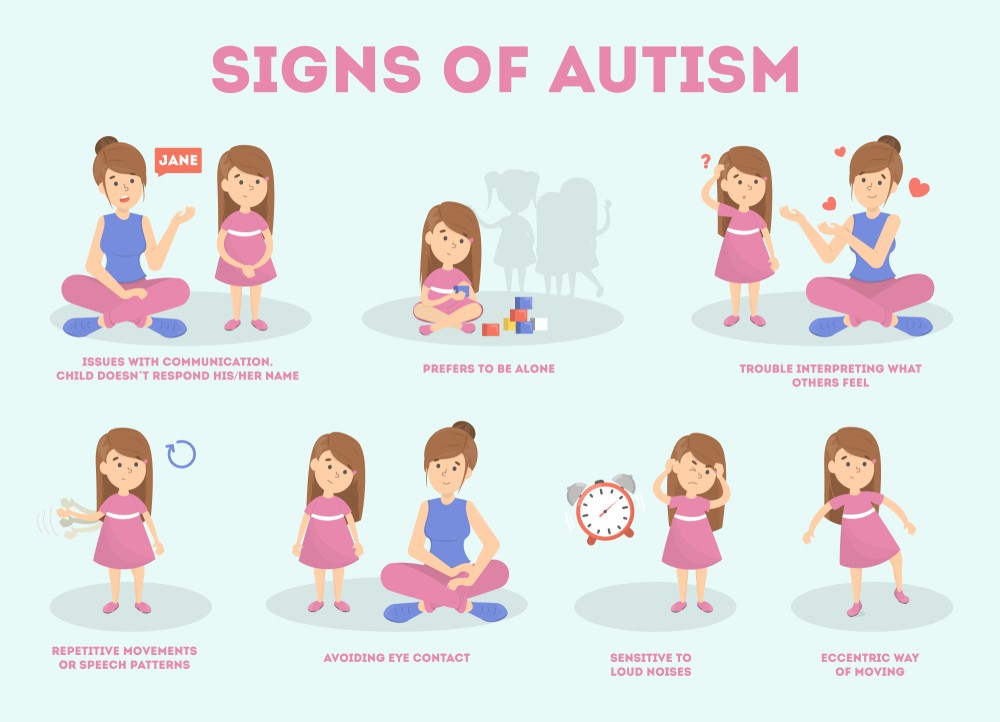
Contents
What Are the 3 Main Symptoms of Autism?
Autism or autistic spectrum disorder (ASD) can manifest as different symptoms in children. The average age of diagnosis is 2 years, though some children may be detected around 5 years old.
The symptoms in children with suspected autism are:
- Delayed milestones
- Social awkwardness
- Trouble with verbal and nonverbal communication
Delayed milestones: Every child starts cooing, rolling over, babbling, smiling, pointing, and sitting up at an age. These are milestones. Though every child grows at their own pace, you should visit a pediatrician if:
- The child does not smile by 6 months.
- The child has no facial expressions by 9 months.
- The child does not make cooing noises or babble by 12 months.
- No pointing or waving by 12 months
- The child does not speak by 16 months.
Signs of social awkwardness: You should be concerned if your child:
- Avoids eye contact while being fed
- Prefers to play alone
- Does not respond to their name
- Does not like being touched
- Prefers fixed routines and becomes upset by even minor changes
- Has trouble understanding and talking about feelings
Problems with verbal and nonverbal communication:
- Repeating words excessively (echolalia)
- Talking in a flat tone
- Difficulty understanding emotions in a conversation
- Difficulty communicating desires
Other important red flags include:
- Regression of milestones: If your child develops milestones but loses them by 12-18 months and stops smiling, cooing, pointing, etc., it is a reason for concern.
- Stimming: If your child shows repetitive behaviors like head flapping, twitching of the eyelid, twirling, or flapping their hands, consult a pediatrician.
- Abnormal eating behavior: Pica (an abnormal desire to eat non-food items such as dirt, clay, ice, or hair), eating only certain food types, or eating only specific colored food.
- Temper tantrums: These are seen in kids between 2-5 years old. The child may be overly agitated, banging their head against the floor, and may have unusual reactions to harmless smells and voices.
Autism or an autistic spectrum disorder (ASD) affects a person’s ability to interact socially. The brain of a child with ASD does not process sounds, sights, and smells like an average person, resulting in socially awkward behaviors.
It is important to note that autism is not contagious and playing with an autistic child will not cause similar signs in another child. There is also no relationship between autism and vaccination.
In some cases, children with autism may have other issues such as mental retardation, convulsions, or hyperactivity. However, some individuals with ASD have higher intelligence and excel in areas such as painting, math, or art. Early detection and intervention are crucial in each case of autism. Early therapy can help improve communication and help parents better understand and reach out to their children.
What should I do if my child has delayed milestones?
Talk to your child specialist about your concerns. While it is normal for every child to achieve milestones at their own pace, you should always be on the lookout for red flags. If the child does not smile, coo, speak, react to affection, or make eye contact, consult a doctor.
You should specifically monitor your child’s growth and development if:
- You were on medications like thalidomide, valproic acid, or antipsychotic medicines during your pregnancy.
- You or your spouse were in your late 30s when you conceived (children born to older parents are at risk).
- You have a family member (child, sibling, parent) with autism.
- You suffered from viral infections during your pregnancy.
- Your baby had a low birth weight.
Always remember:
A "wait and watch" policy will not help a child with an autistic spectrum disorder. From 1-2 years of age, the brain is still developing, and starting therapy at this point can address most symptoms of autism. While autism is currently not curable, early intervention during the preschool years can help children manage behavioral issues and cope better in social situations. Behavioral therapy involves teaching parents how to reach out to their children. Children experiencing hyperactivity, convulsions, and sleep problems may also require early medical management.
What is high-functioning autism?
High-functioning autism is not a medical diagnosis and refers to people with autism who can read, write, handle basic skills, or live independently. The umbrella term for various autism disorders is autism spectrum disorder.
Asperger syndrome and high-functioning autism are milder forms of autism.
What are some signs of high-functioning autism?
People with high-functioning autism can handle basic skills but have difficulties with communication.
High-functioning autism refers to autism spectrum disorder where people can read, write, and handle basic skills.
- However, they still have difficulties with social interaction and communication.
- They are slow to take social cues and face challenges making friends.
Some communication challenges that a person with high-functioning autism may face include:
- Difficulty participating in conversation
- Trouble connecting with others’ thoughts or feelings
- Difficulty reading others’ body language and facial expressions
- Inability to understand sarcasm or emotions in conversation
- Using a flat tone or robotic pattern of speaking
- Inventing their own descriptive words and phrases
- Not understanding figures of speech or idioms
- Discomfort with eye contact
- Using the same tone or speaking patterns in different settings
- Having a narrow focus on one or two favorite topics
- Difficulty building and maintaining close friendships
Some emotional and behavioral difficulties faced by people with high-functioning autism include:
- Trouble regulating emotions and responses
- Outbursts or meltdowns following routine or expectation changes
- Responding with emotional meltdowns to unexpected events
- Getting upset with rearrangements and changes
- Following rigid routines and patterns
- Engaging in repetitive behaviors and rituals
- Making noises in inappropriate settings
Food behaviors exhibited by people with autism include:
- Being particular about food groups, such as sweet, salty, or bitter
- Accepting or rejecting foods based on texture, smell, color, or temperature
- Using sauce on all food
- Stuffing food in the mouth due to lack of sensory sensitivity
- Biting inner lips and cheeks when encountering disliked foods
- Requiring food to be presented in the same manner each time
Other signs of high-functioning autism include:
- Being highly knowledgeable about specific areas of interest
- Being skilled in a few academic subject areas but struggling in others
- Experiencing hypersensitivity or impaired sensitivity to sensory input
- Having difficulties with coordination and clumsiness
- Prefering to engage in solitary activities
- Being seen as eccentric or academically inclined


